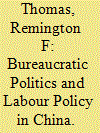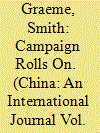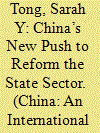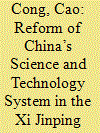|
|
|
Sort Order |
|
|
|
Items / Page
|
|
|
|
|
|
|
| Srl | Item |
| 1 |
ID:
161970


|
|
|
|
|
| Summary/Abstract |
This article places Xi Jinping’s accumulation of personal power and top-down crusade against bureaucratic corruption in broader historical perspective. His moves are a response to China’s distinctive political and economic trajectory in the era of reform, one that for the first time makes possible the accumulation of property and wealth by the families of officials. Although Xi’s approach is often seen as a throwback to practices of the Mao era, it in fact revives the bureaucratic legacy of Liu Shaoqi, not the anti-elitist radicalism of Mao Zedong. China’s problem of bureaucratic corruption has little precedent in the history of the Communist Party of China, or of the Soviet Union in the past, but bears eerie parallels with the problems that beset the Guomindang during its years on the Mainland.
|
|
|
|
|
|
|
|
|
|
|
|
|
|
|
|
| 2 |
ID:
161974


|
|
|
|
|
| Summary/Abstract |
Historical institutionalism has demonstrated the value of close analysis of policymaking to illuminate the relationship between institutional change and policy outcomes. This article emphasises the importance of the institutional setting in which state agencies in an authoritarian regime shape the agenda for choice, resolve disagreements and implement decisions. It outlines a model of policymaking and policy implementation in the sphere of labour relations in China by examining these three issue areas: enforcement of labour contract legislation, technical and vocational education and training (TVET) and pension reform. In all three, policymaking reflects the interaction of state entities, with minimal participation by non-state actors. However, in China, more than in other post-communist countries, political authority is dispersed across state bodies with overlapping responsibilities and levels of the administrative hierarchy. As a result, new policy initiatives tend to be “layered” on top of older ones rather than displacing them, and implementation tends to be hampered by jurisdictional competition and diverging bureaucratic policy preferences. This pattern helps account for the pattern of incremental change and weak implementation.
|
|
|
|
|
|
|
|
|
|
|
|
|
|
|
|
| 3 |
ID:
161977


|
|
|
|
|
| Summary/Abstract |
The broad aim of this article is to analyse the institutions of China’s rural local governments in their own right, and thus further our understanding of the political and social mechanisms that maintain and support them. What changes do rural officials’ evolving notions of “development” and “modernisation” under Xi Jinping bring? What shifts can we detect? This article focuses on two developments under Xi: the increased role of the Party-led “leading small groups” in Chinese local governments, and Xi’s “war on poverty”, which aims to lift all Chinese citizens out of poverty by 2020 through a mixture of targeted fiscal support and compulsory resettlement of millions of rural residents. Examining these developments sheds some insights into Xi’s efforts to remodel the Chinese polity and society. Do they represent a real break with past practice, or do they provide evidence of continuity with previous trends in China’s institutions of rural governance?
|
|
|
|
|
|
|
|
|
|
|
|
|
|
|
|
| 4 |
ID:
161973


|
|
|
|
|
| Summary/Abstract |
How China’s “new normal” affects the conduct of monetary policy deserves a careful study. The enormous task of economic restructuring, amid conflicting goals, has certainly introduced a new set of challenges to macroeconomic management. This article provides empirical evidence to show that the conduct of China’s monetary policy has indeed changed and become less predictable since 2013. While supply-side structural adjustments significantly decrease local governments’ appetite for investment and create slacks in aggregate demand, macroeconomic policymakers feel compelled to ease off deleveraging pressures when the adjustment pains are considered unbearable. The monetary authority also faces the policy trilemma when the internationalisation of the renminbi requires a strong currency and free flow of capital. Furthermore, the dual-track interest rate system creates speculative capital movements between bank deposits and the money market which complicates the transmission mechanism of monetary policy. Inconsistencies are thus created, and reversals of policy direction are frequently observed.
|
|
|
|
|
|
|
|
|
|
|
|
|
|
|
|
| 5 |
ID:
161971


|
|
|
|
|
| Summary/Abstract |
There have been high expectations for renewed reforms of China’s numerous and hugely diverse state-owned enterprises (SOEs). Directed by two important documents of top-level design, the reform plan incorporates useful policy elements, such as allowing the market to play a larger role and making the shift from asset to capital management, all of which demonstrate a move in the right direction. However, many issues, especially the role of the Party and SOE monopoly, remain unsolved and need to be further illuminated. Nevertheless, encouraging progress has been made via pilot programmes and local experiments in areas such as mixed ownership reforms and making the shift to capital management.
|
|
|
|
|
|
|
|
|
|
|
|
|
|
|
|
| 6 |
ID:
161969


|
|
|
|
|
| Summary/Abstract |
This article argues that the essence of China’s neo-socialism under Xi Jinping is a CPC-led (Communist Party of China) ranking-stratified political order. This political order diverges not only from Western democratic values, but also from the general reform trend of the Deng Xiaoping era. During the 1980s, Deng promoted the separation of “Party and government” and “government and business” in an attempt to avoid the CPC “taking on and intervening in everything”. The article details how this reform trend has been reversed under Xi Jinping. Instead of notions of separation, the dominant slogan is “bidirectional entry and cross appointment”. Thus, in many localities, the Party secretary also serves as chairman of the local national people’s congress and in state-owned companies, the Party secretary duplicates as chairman of the board. The article also shows how the Party has strengthened its authority and centralised power in the hands of Xi Jinping. The result is the fusion of Party and state or what can be called the transition from Party-state to state-Party.
|
|
|
|
|
|
|
|
|
|
|
|
|
|
|
|
| 7 |
ID:
161975


|
|
|
|
|
| Summary/Abstract |
China’s science and technology (S&T) system has experienced significant reform in the Xi Jinping era. This article discusses the evolution, progress, problems and prospects of the reform. For a better understanding of the reform from a holistic perspective, we propose a conceptual framework distinguishing the national S&T system at the macro, meso and micro levels. This article pays particular attention to Xi’s views as guiding principles and the reorganisation of S&T administration at the macro level; the overhaul of the national S&T programmes at the meso level; and the rather ambivalent attitude towards budgeting and spending of funds for S&T projects, and the evaluation system at the micro level. The article also analyses the reform in the Chinese Academy of Sciences as a case study. It concludes with a discussion of the implications of the integration of “top-level design” and the “whole nation system” for the future of China’s S&T enterprise.
|
|
|
|
|
|
|
|
|
|
|
|
|
|
|
|
| 8 |
ID:
161978


|
|
|
|
|
| Summary/Abstract |
China’s distorted regional policy and geographical factors have led to unbalanced development in various regions, posing a major threat to the sustainability of the Chinese domestic economy. To address the thorny problem of the widening regional disparities, the Chinese authorities have proposed new policy initiatives and implemented measures that are targeted to promote an equitable and sustainable model of regional development in China. The pursuit of regional common prosperity is essential to retaining the performative legitimacy of the Communist Party of China (CPC) and maintaining sustainable economic development in China. While the previous administration was unable to find an effective solution to the daunting issue of regional economic disparities in China, President Xi Jinping and other Chinese leaders are determined to rise to this challenge. This article examines Xi’s vision of achieving balanced regional development and discusses the government’s regional reform initiatives over the past five years and the challenges it has faced.
|
|
|
|
|
|
|
|
|
|
|
|
|
|
|
|
| 9 |
ID:
161976


|
|
|
|
|
| Summary/Abstract |
A large body of research has shown growing class inequalities in educational attainment in post-Mao China. The more advantaged families have benefited more from educational expansion and development. This article argues that class inequalities in education are unlikely to decline under the Xi Jinping leadership. While Xi makes frequent references to Maoist ideas and concepts, he is also pushing for the “innovation-driven development” strategy, which will continue to stratify China’s educational system in favour of elite schools and universities. At the policy level, there will be initiatives seeking to reduce educational inequality. However, there will not be an overhaul as radical as in the Mao era.
|
|
|
|
|
|
|
|
|
|
|
|
|
|
|
|
| 10 |
ID:
161972


|
|
|
|
|
| Summary/Abstract |
Under the current Chinese government, a flurry of laws and regulations has seemingly crushed much of the online freedom that Chinese netizens appeared to enjoy during the first decade of the 21st century. However, a closer look shows that the laws issued by the government of Xi Jinping are more an extension and tightened enforcement of prior policies and regulations rather than new regulations relating specifically to the internet. This article demonstrates that the regulations, policies and laws issued by the Chinese government since 2012 represent a normalisation of the internet by a comparatively transparent government (with respect to the internet), which can serve and is increasingly being used as a model for other governments.
|
|
|
|
|
|
|
|
|
|
|
|
|
|
|
|
|
|
|
|
|